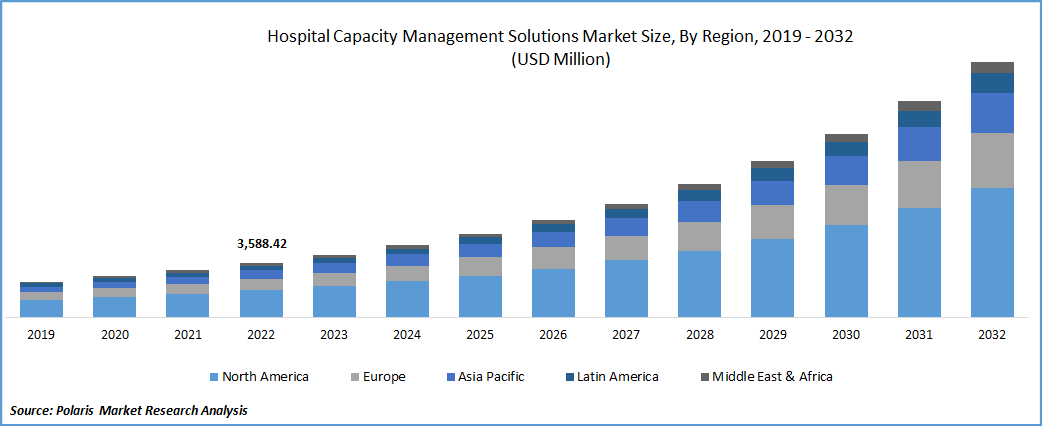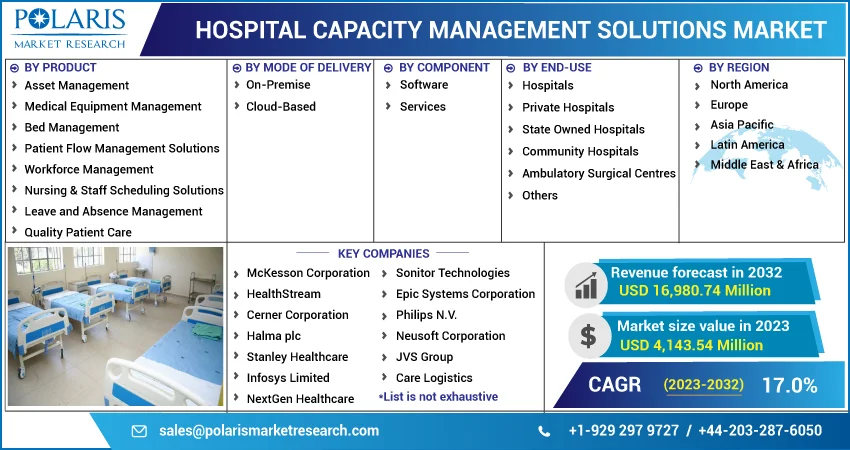
Hospital Capacity Management Solutions Market Share, Size, Trends, Industry Analysis Report, By Product (Asset Management, Patient Flow Management Solutions, Workforce Management, Quality Patient Care), By Mode of Delivery, By Component, By End-Use, By Regions, Segments & Forecast, 2023 – 2032
- Published Date:Mar-2023
- Pages: 119
- Format: PDF
- Report ID: PM1930
- Base Year: 2022
- Historical Data: 2019-2021
Report Outlook
The global hospital capacity management solutions market was valued at USD 3,588.42 million in 2022 and is expected to grow at a CAGR of 17.0% during the forecast period. The major key drivers supporting the growth of the market are the need to optimize the escalating healthcare costs, better capacity management in healthcare institutions, and the advantages of capacity managing solutions in improving patients' safety and care. The secondary reasons behind the need for hospital capacity management solutions can be attributed to the adoption of IoT technology in healthcare services, increasing patient pools in hospitals for chronic diseases, and demand for mobile hospital management solutions.

Know more about this report: Request for sample pages
Hospital Capacity Management Solutions (HCMS) are the technologies and devices that assist healthcare facilities in efficiently managing patient services and optimizing other operations. The system empowers hospital executives, clinical staffs, and administrators with real-time hospital asset tracking and capacity planning. Moreover, the solutions also help to track the current capacity levels of the hospitals, forecast the levels over a range of periods such as 4, 8, 12, 24, and 72 hours and can generate alerts regarding the shortage of hospital resources.
Increasing expenditure on healthcare services in the last few years has remained one of the crucial factors for healthcare institutions and resulted in better investment in advanced medical care services. For instance, according to American Medical Association, the health care spending in the U.S. has increased by 9.7% in 2022 to $4.1 trillion or $12,350 per capita. The substantial acceleration in spending can result from increased government spending to manage the pandemic. Among the spending, the top three categories that received the most attention are hospital care (30.8%), physician services (14.4%), and prescription drugs (8.4%). The increasing federal budget towards improving healthcare facilities, coupled with the rising out-of-pocket expenditure of patients, has established several private healthcare institutions in the last decade.
The major limiting factors for the growth of the HCMS market can be attributed to the higher establishment cost of capacity management solutions. On top of that, it requires a substantial recurring cost to maintain and upgrade the software from time to time. The ownership costs of the system are further risen by the need for training and upskilling the hospital personnel to operate the system effectively and efficiently. Other challenges for the market are projected to be issues related to data security and privacy. With the advancement of the system, hospital management has been extensively using healthcare-based Internet of Things (IoT) platforms by integrating with smart sensors that enable healthcare organizations to monitor and track various operations in a single dashboard. But in the last few years, many data breaching and hacking cases have been witnessed across many organizations that might pose an urgent need for the institutions to take care of the patient's data privacy.
The covid-19 pandemic positively impacts the demand and sale of hospital capacity management solutions. The pandemic has resulted in the wake of overcrowded hospitals, shortage of hospital beds and physicians, lack of oxygen cylinders, difficulty maintaining adequate staffing and supporting staffs, and depletion of essential medical supplies and logistic support. All the irregularities mentioned above in hospitals have fueled the need to manage the resources better, increasing the adoption of the solution system.

Know more about this report: Request for sample pages
Industry Dynamics
Growth Drivers
The increasing medical inflation has been the major factor in adopting hospital healthcare management solutions in the last decade. Advanced medical equipment, well-developed infrastructure, and onboarding skilled physicians have increased the cost to private healthcare organizations and finally raised the cost of treatment to patients. For instance, as per the white paper published by MediBuddy, an Indian digital healthcare platform, the average cost of treating gastrointestinal diseases in India has increased by more than 15.4% in four years. The paper also reported the rising treatment costs of top ailments such as infectious diseases, cataracts, injuries, fractures, and dislocations. The increasing costs to patients have caused the government and the institution’s management to control the costs by reducing patient readmissions, and administration costs, minimizing the delays, and optimizing the wrong placement of patients by utilizing capacity management software such as asset management or workforce management.
Other major factors affecting the current and future demand for capacity management solutions from healthcare institutions are the rising patient volume due to chronic disorders and the increasing need for healthcare facilities among patients. For instance, as per National Center for Chronic Disease Prevention and Health Promotion (NCCDPHP), nearly six in ten adults in the United States have a chronic disease, and four in ten adults have more than one disease, such as heart issues, cancer, chronic lung disease, Alzheimer’s disease, diabetes, and chronic kidney diseases. The increasing number of chronic patients across the globe has resulted in greater requirements for hospital beds, workforces, infrastructure, and a system to manage the capacity for all the resources.
Further, the increasing need for better healthcare management has also been considered a pushing factor for better capacity management. The growing adoption of advanced technology and devices has escalated the need for a system to manage all the resources in a single software, boosting the hospital capacity management solutions market.
Report Segmentation
The hospital capacity management solutions market is primarily segmented based on product, mode of delivery, component, end-use, and region.
|
By Product |
By Mode of Delivery |
By Component |
By End-Use |
By Region |
|
|
|
|
|
Know more about this report: Request for sample pages
Asset Management Segment Accounted for the Largest Market Share in 2022
Hospital Capacity Management Solutions (HCMS) aids the hospital staff, and patients in using the assets whenever needed by keeping track of their location which further contributes to easy inventory management. Government initiatives to improve the healthcare system and reduce treatment costs are projected to propel growth for capacity management solutions in the coming years.
The quality patient care segment is likely to register significant growth in capacity management solutions over the forecast period reported for increasing demand for IoT in the clinics for live tracking of patients safeguarding the safety, which is a major concern for hospitals with a larger number of patients.
The workforce management segment has promising growth opportunities in the coming years, with increasing demand for efficient workforce managing to reduce cost and improve productivity. The rising number of public and private hospitals is the major driving factor for market development for capacity management. Increasing competition in the healthcare segment is acting as a catalyst for market advancement.
The Software Segment is Anticipated to Account For a Major Share in 2022
Major factors supporting the hospital capacity management solutions market growth in the given period include the rising adoption of computer-based tools, telemedicine services, digital health apps, and increased digitalization. The tools mentioned above and services require robust software which can facilitate the healthcare organization to control it in a single platform.
Hospital Segment is Projected to Account for Highest Market Share in 2022
The increasing need to manage hospital operations more efficiently has given rise to the significant adoption of hospital capacity management solutions in the last few years. In the hospital segment, state-owned hospitals accounted for a major share due to huge hospital patient admissions in the pandemic and post-pandemic period.
In addition, the private hospital segment is expected to witness a rapid CAGR in the forecast period, supported by the increasing number of private medical institutions driven by shifting towards better healthcare facilities provided by private players.
North America Region is Projected to Account for a Major Share in the Market in 2022
Major factors contributing to the sector's growth include increased chronic disease patients in the U.S. and key healthcare players such as Center Corporation, NextGen Healthcare, Simul8 Corporation, McKesson Corporation, and Allscripts Healthcare Solutions. The adoption of HCMS in the region is further fueled by strong government policies and expenditures for making better healthcare facilities.
The Asia Pacific market is expected to grow rapidly during the forecast period owing to government initiatives to reduce healthcare-associated costs and strict regulations for effective treatments. The growing population in the region with increasing disposable income creates new market opportunities and thus has promised the solutions market growth potential over the coming years.
Competitive Insight
Some of the prominent key players operating in the Marketspace include McKesson Corporation, HealthStream, Cerner Corporation, Halma plc, Stanley Healthcare, Infosys Limited, NextGen Healthcare, Allscripts Healthcare Solutions, Inc., Sonitor Technologies, Epic Systems Corporation, Philips N.V., Neusoft Corporation, JVS Group, Infginitt Healthcare Co. Ltd., Care Logistics, Cerner Corporation, CenTrak, Inc.
Recent Developments
- January 2023: CenTrak, Inc. has launched Workflow, a cloud-based platform designed to automate Workflow and communication to reduce the concern of manual documentation required in various phases of clinical care.
- April 2021: Halma plc has acquired PriGen, a company in North Carolina to broaden its market presence in advanced patient assessment and monitoring and enhanced the company’s analytics and artificial intelligence capabilities.
Hospital Capacity Management Solutions Market Report Scope
|
Report Attributes |
Details |
|
Market size value in 2023 |
USD 4,143.54 million |
|
Revenue forecast in 2032 |
USD 16,980.74 million |
|
CAGR |
17.0 % from 2023 - 2032 |
|
Base year |
2022 |
|
Historical data |
2018 - 2021 |
|
Forecast period |
2023 - 2032 |
|
Quantitative units |
Revenue in USD million and CAGR from 2023 to 2032 |
|
Segments covered |
By Product, By Mode of Delivery, By Component, By End-Use, By Region |
|
Regional scope |
North America, Europe, Asia Pacific, Latin America, Middle East & Africa |
|
Key companies |
McKesson Corporation, HealthStream, Cerner Corporation, Halma plc, Stanley Healthcare, Infosys Limited, NextGen Healthcare, Allscripts Healthcare Solutions, Inc., Sonitor Technologies, Epic Systems Corporation, Philips N.V., Neusoft Corporation, JVS Group, Infginitt Healthcare Co. Ltd., Care Logistics, Cerner Corporation, CenTrak, Inc. |
FAQ's
Key companies in hospital capacity management solutions market are Marketspace include McKesson Corporation, HealthStream, Cerner Corporation, Halma plc, Stanley Healthcare, Infosys Limited, NextGen Healthcare, Allscripts Healthcare Solutions, Inc., Sonitor Technologies.
The global hospital capacity management solutions market expected to grow at a CAGR of 17.0% during the forecast period.
The hospital capacity management solutions market report covering key segments are product, mode of delivery, component, end-use, and region.
Key driving factor in hospital capacity management solutions market are growing adoption of advanced technology and devices.
The global hospital capacity management solutions (HCMS) market size is expected to reach USD 16,980.74 million by 2032.
